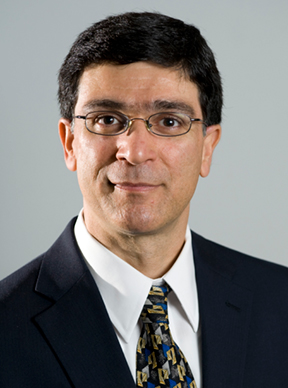Director, Memory Consultation Clinic, Glennan Center for Geriatrics and Gerontology at Eastern Virginia Medical School; Associate Professor, EVMS
 To Dr. Hamid Okhravi, the Alzheimer’s Association is a critical partner in research, education and support for patients and caregivers facing a diagnosis of dementia. Volunteering for the organization’s Southeastern Virginia Chapter, then, is an easy choice.
To Dr. Hamid Okhravi, the Alzheimer’s Association is a critical partner in research, education and support for patients and caregivers facing a diagnosis of dementia. Volunteering for the organization’s Southeastern Virginia Chapter, then, is an easy choice.
Since arriving at Eastern Virginia Medical School in 2010, Dr. Okhravi has served on multiple medical and scientific committees and spoken regularly at community forums and fundraising and media events. All the while, he is treating patients and conducting research at EVMS’ busy memory clinic.
“Hopefully, we will one day have a cure for dementia,” he says. “But even right now, there is so much we can do to help patients – from making an accurate diagnosis to teaching caregivers how to manage emotional, physical and financial challenges.”
As many as half of all dementia cases go undiagnosed by physicians, about a third of caregivers lose most or all of their life savings, and nearly every patient develops neuropsychiatric symptoms such as depression, apathy, agitation, hallucinations or delusions. All can contribute to caregiver depression and nursing home placement.
When Dr. Okhravi lectures to physicians and residents, he has one constant piece of advice: “I tell them, ‘The best thing you can do for these patients and their caregivers is to refer them to the Alzheimer’s Association.’ They can find support in so many different areas.” At his sessions for the general public, question-and-answer sessions can easily stretch an hour.
A native of Iran, Dr. Okhravi and his three sisters – all doctors – grew up idolizing an uncle who was an orthopedic surgeon. After graduating from Mashhad University of Medical Sciences in Iran, he did an Internal Medicine residency at St. Louis University and then Hurley Medical Center at Michigan State University, followed by a Geriatrics fellowship at the Mayo Clinic in Minnesota. There, he worked with Dr. Ronald Petersen, a national leader in the field of Alzheimer’s disease.
“I always found geriatrics to be fascinating, challenging and fulfilling,” he relates.
Over the past eight years, EVMS’ Memory Consultation Clinic has grown from seeing patients a half day a week to offering daily slots. Dr. Okhravi also recently collaborated with the Alzheimer’s Association to create a new caregiver support group attended by 30 people a month.
Meanwhile, his research has drawn local patients into promising trials. For example, Dr. Okhravi was a site principal investigator on the Imaging Dementia – Evidence for Amyloid Scanning (IDEAS) Study, a nationwide study that next year will publish a report on the clinical usefulness of brain scans to detect plaques. About 75 of his patients from Hampton Roads were among 18,000 enrolled.
EVMS and Old Dominion University now have partnered to develop wearable sensors that could detect oncoming agitation in patients, by monitoring subtle shifts such as increased heart rate and breathing or limb movements. The sensors then could alert caregivers or even link to a digital assistant to play soothing music or display old photographs.
“We’re so lucky to have Dr. Okhravi here,” says Katie McDonough, Director of Programs & Public Policy for the Alzheimer’s Association’s regional chapter. “In addition to his research, he somehow makes himself available anytime we ask him. He’s one of our biggest champions.”
Dr. Okhravi, in turn, credits Alzheimer’s Association advocacy for boosting federal research funding, which he believes will produce therapies to modify the disease process within a few years. In his eyes, the more families that turn to the organization, the better.
“I’ll do anything I can to educate people, ease their stress and direct them to the right resources,” he says. “Honestly, that’s one of the most rewarding parts of my job.”
Throughout Hampton Roads, there are physicians who regularly volunteer their time, knowledge, training and experience to individuals and organizations in this community, in the nation and throughout the world. They do so quietly, without fanfare, and often without reward or recognition of any kind. Hampton Roads Physician is pleased to acknowledge these physicians by sharing their good deeds with our readers.

